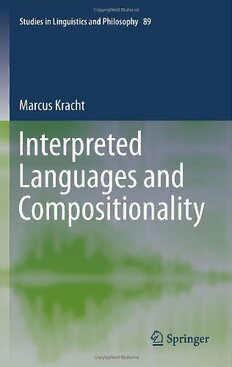Download Interpreted Languages and Compositionality PDF Free - Full Version
Download Interpreted Languages and Compositionality by Marcus Kracht (auth.) in PDF format completely FREE. No registration required, no payment needed. Get instant access to this valuable resource on PDFdrive.to!
About Interpreted Languages and Compositionality
This book argues that languages are composed of sets of ‘signs’, rather than ‘strings’. This notion, first posited by de Saussure in the early 20th century, has for decades been neglected by linguists, particularly following Chomsky’s heavy critiques of the 1950s. Yet since the emergence of formal semantics in the 1970s, the issue of compositionality has gained traction in the theoretical debate, becoming a selling point for linguistic theories.Yet the concept of ‘compositionality’ itself remains ill-defined, an issue this book addresses. Positioning compositionality as a cornerstone in linguistic theory, it argues that, contrary to widely held beliefs, there exist non-compositional languages, which shows that the concept of compositionality has empirical content. The author asserts that the existence of syntactic structure can flow from the fact that a compositional grammar cannot be delivered without prior agreement on the syntactic structure of the constituents.
Detailed Information
| Author: | Marcus Kracht (auth.) |
|---|---|
| Publication Year: | 2011 |
| ISBN: | 9789400721074 |
| Pages: | 223 |
| Language: | |
| File Size: | 1.56 |
| Format: | |
| Price: | FREE |
Safe & Secure Download - No registration required
Why Choose PDFdrive for Your Free Interpreted Languages and Compositionality Download?
- 100% Free: No hidden fees or subscriptions required for one book every day.
- No Registration: Immediate access is available without creating accounts for one book every day.
- Safe and Secure: Clean downloads without malware or viruses
- Multiple Formats: PDF, MOBI, Mpub,... optimized for all devices
- Educational Resource: Supporting knowledge sharing and learning
Frequently Asked Questions
Is it really free to download Interpreted Languages and Compositionality PDF?
Yes, on https://PDFdrive.to you can download Interpreted Languages and Compositionality by Marcus Kracht (auth.) completely free. We don't require any payment, subscription, or registration to access this PDF file. For 3 books every day.
How can I read Interpreted Languages and Compositionality on my mobile device?
After downloading Interpreted Languages and Compositionality PDF, you can open it with any PDF reader app on your phone or tablet. We recommend using Adobe Acrobat Reader, Apple Books, or Google Play Books for the best reading experience.
Is this the full version of Interpreted Languages and Compositionality?
Yes, this is the complete PDF version of Interpreted Languages and Compositionality by Marcus Kracht (auth.). You will be able to read the entire content as in the printed version without missing any pages.
Is it legal to download Interpreted Languages and Compositionality PDF for free?
https://PDFdrive.to provides links to free educational resources available online. We do not store any files on our servers. Please be aware of copyright laws in your country before downloading.
The materials shared are intended for research, educational, and personal use in accordance with fair use principles.

